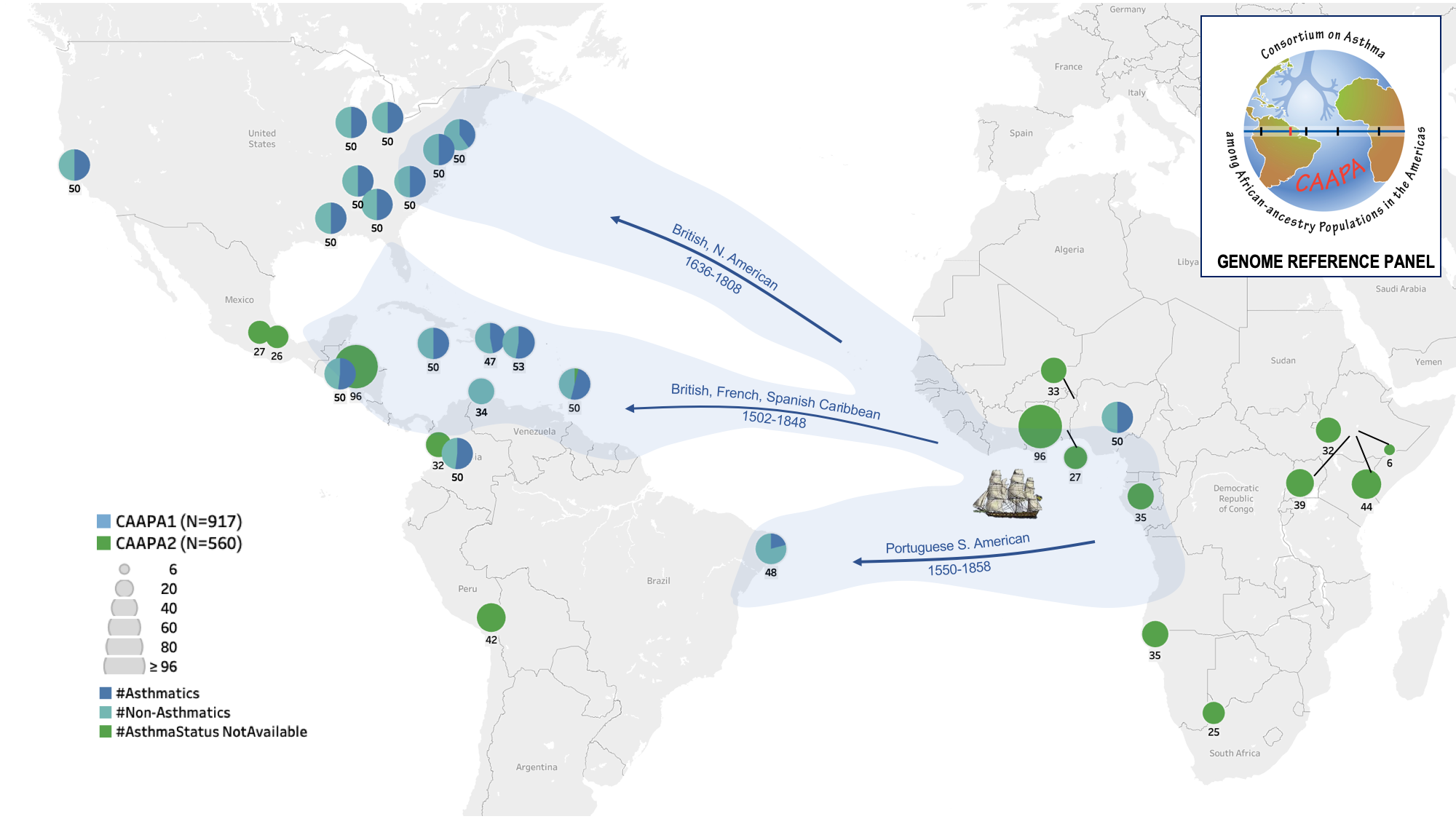CAAPA Mission
In September, 2011, the Consortium on Asthma among African-ancestry Populations in the Americas (CAAPA) received support from the National Institutes of Health, National Heart, Lung and Blood Institute, to achieve two broad goals:
discovery of genes conferring risk to asthma among individuals of African ancestry
catalog genetic diversity in populations of African descent, especially those whose ancestry reflects the African Diaspora in the Americas.
To achieve these goals, CAAPA investigators are integrated publicly available databases (i.e., 1000 Genomes Project, genomic and exomic sequence data generated as part of NIH-supported ARRA projects), with whole genome sequencing data, generated on ~1,000 asthmatics and non-asthmatics, all of African ancestry, selected across North & South America, the Caribbean, and continental Africa, to represent a large spectrum of African ancestry. In the second phase of CAAPA, we developed a custom, gene-centric SNP genotyping array of up to 1M variants, appropriate for individuals of African descent to complement current, commercially available genomewide chips, which provide sub-optimal tagging of known genes among individuals of African descent. This “African Power Chip” can be used to build upon GWAS studies in populations of African descent. Once developed, This SNP chip was genotyped on >12,000 DNA samples representing African American and African Caribbean asthmatics and non-asthmatics. Genotype data from this SNP chip was combined with existing GWAS data to test for association to identify candidate genes for asthma in populations of African descent. CAAPA involves a well-established group of experienced investigators, representing 10 national and 5 international academic institutions, with diverse but integrated areas of expertise.
Asthma
Asthma is a complex chronic lung disease that affects the airways. Asthma has striking disparities across racial and ethnic groups.
Courtesy: NHLBI
Asthma in African ancestry
Asthmatics of African descent tend to have more severe asthma and more severe clinical symptoms than individuals of European ancestry. See CDC annual report and National Institute on Minority Health and Health disparities.
Advances in genetic and genomic technologies have revolutionized gene discovery for several complex diseases, but going to the next step in gene discovery for asthma among populations of African descent requires considering unique characteristics of this ethnic group, including adequate sample sizes, population stratification due to (European and African) admixture, and perhaps most importantly, an approach that recognizes the current coverage of common genetic markers both in public databases and commercially available SNP chips, which have been inadequate to detect and measure genetic associations among African admixed populations.
About CAAPA
The Consortium on Asthma among African-ancestry Populations in the Americas (CAAPA) is funded by the National Institutes of Health, National Heart, Lung and Blood Institute (NHLBI) to investigate the genetics of asthma in African ancestry populations.
Multi-omics in CAAPA
While there is mounting evidence that asthma risk variants may play a role in the regulation of immune system pathways, molecular mechanisms underlying asthma heterogeneity and their signals at GWAS loci are poorly described. With a few exceptions like the Chr17q locus, GWAS loci have offered limited novel insight into the biology of asthma, and even less into the complex heterogeneity and disparities in asthma. Transcriptomic approaches have demonstrated some success in profiling asthma endotypes and epigenetics can provide mechanistic understanding of the regulation of these transcriptomic signatures, especially in the context of environment.
In this second phase of CAAPA, we hypothesized transcriptomic signatures from the nasal airway epithelium in asthma cases and controls representing the African Diaspora will allow us to validate previously identified gene expression signatures of asthma and, importantly, identify pathways of dysregulation that are novel and relevant to the disparities observed with respect to asthma. We rely on nasal epithelium as a proxy for the airways given its ease of tissue collection on large numbers of individuals and the established correlation between signatures of asthma between nasal epithelium and bronchial tissue. We generated RNA sequencing and DNA methylation data from the same nasal epithelium samples in newly recruited subjects representing 7 locations across the African Diaspora: Baltimore, Washington DC, Chicago and Denver in the United States; Salvador, Brazil; Barbados in the Caribbean; and Nigeria in West Africa.
We are examining transcriptomic differences between current asthma cases and never-asthma controls to identify differentially expressed individual genes and networks of co-expressed genes. We are also evaluating the role of DNA methylation in regulating gene expression signatures. Our integrative ‘omic’ approach thus far has revealed dysregulation on three axes – increased Th2 inflammation, decreased capacity for wound healing in airway epithelium, and impaired drug response – that play a role in the development of asthma in individuals of African ancestry. While each is associated with risk for asthma, the impact of dysregulation on multiple axes bears a cumulative risk beyond any single axis directly.
Resources created
CAAPA1 and CAAPA2 WGS sites
The CAAPA flagship paper by Mathias et.al serves as an important resource in disease mapping studies in African-admixed individuals.
Developing ADPC (The African diaspora Power Chip) is a genotyping array consisting of tagging SNPs, useful in comprehensively identifying African specific genetic variation. The paper from Johnston et.al highlights the significance of ADPC.
The MEGA (Multi Ethnic Genotyping Array) from Illumina leverages the CAAPA and Population Architechture in Genomics and Epidemiology (PAGE) studies, to produce arrays with comprehensive multi-ethnic coverage and updated functional and exome content.
CAAPA genomes are available as a reference panel on the michigan imputation server.
CAAPA data is available to download on dbGAP with Accession ID:phs001123.v1.p1.
Value
population genetics point of view: Tales of African American History found in DNA






